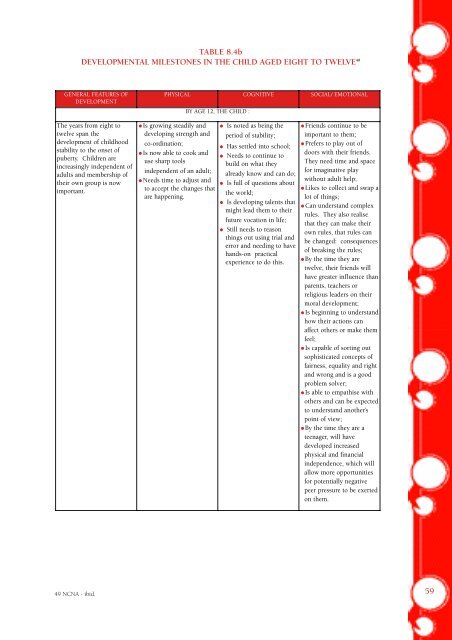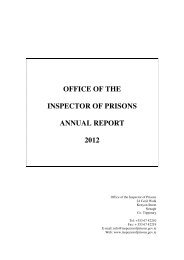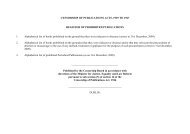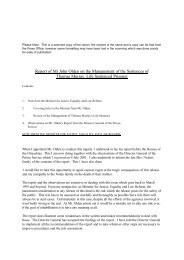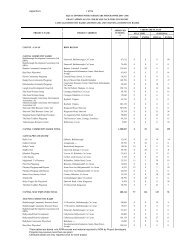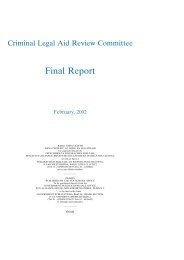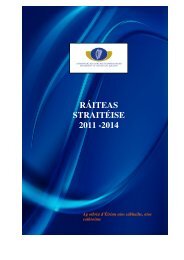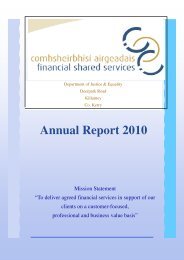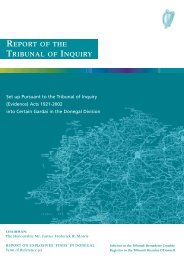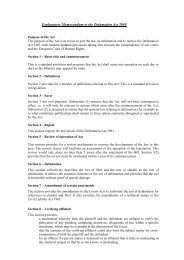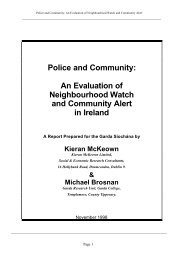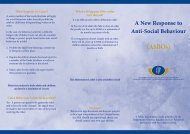Developing School Age Childcare - Department of Children and ...
Developing School Age Childcare - Department of Children and ...
Developing School Age Childcare - Department of Children and ...
You also want an ePaper? Increase the reach of your titles
YUMPU automatically turns print PDFs into web optimized ePapers that Google loves.
TABLE 8.4bDEVELOPMENTAL MILESTONES IN THE CHILD AGED EIGHT TO TWELVE 49GENERAL FEATURES OFDEVELOPMENTPHYSICAL COGNITIVE SOCIAL/ EMOTIONALBY AGE 12, THE CHILD :The years from eight totwelve span thedevelopment <strong>of</strong> childhoodstability to the onset <strong>of</strong>puberty. <strong>Children</strong> areincreasingly independent <strong>of</strong>adults <strong>and</strong> membership <strong>of</strong>their own group is nowimportant.Is growing steadily <strong>and</strong>developing strength <strong>and</strong>co-ordination;Is now able to cook <strong>and</strong>use sharp toolsindependent <strong>of</strong> an adult;Needs time to adjust <strong>and</strong>to accept the changes thatare happening. Is noted as being theperiod <strong>of</strong> stability; Has settled into school; Needs to continue tobuild on what theyalready know <strong>and</strong> can do; Is full <strong>of</strong> questions aboutthe world; Is developing talents thatmight lead them to theirfuture vocation in life; Still needs to reasonthings out using trial <strong>and</strong>error <strong>and</strong> needing to haveh<strong>and</strong>s-on practicalexperience to do this.Friends continue to beimportant to them;Prefers to play out <strong>of</strong>doors with their friends.They need time <strong>and</strong> spacefor imaginative playwithout adult help;Likes to collect <strong>and</strong> swap alot <strong>of</strong> things;Can underst<strong>and</strong> complexrules. They also realisethat they can make theirown rules, that rules canbe changed: consequences<strong>of</strong> breaking the rules;By the time they aretwelve, their friends willhave greater influence thanparents, teachers orreligious leaders on theirmoral development;Is beginning to underst<strong>and</strong>how their actions canaffect others or make themfeel;Is capable <strong>of</strong> sorting outsophisticated concepts <strong>of</strong>fairness, equality <strong>and</strong> right<strong>and</strong> wrong <strong>and</strong> is a goodproblem solver;Is able to empathise withothers <strong>and</strong> can be expectedto underst<strong>and</strong> another’spoint <strong>of</strong> view;By the time they are ateenager, will havedeveloped increasedphysical <strong>and</strong> financialindependence, which willallow more opportunitiesfor potentially negativepeer pressure to be exertedon them.49 NCNA - ibid.59


